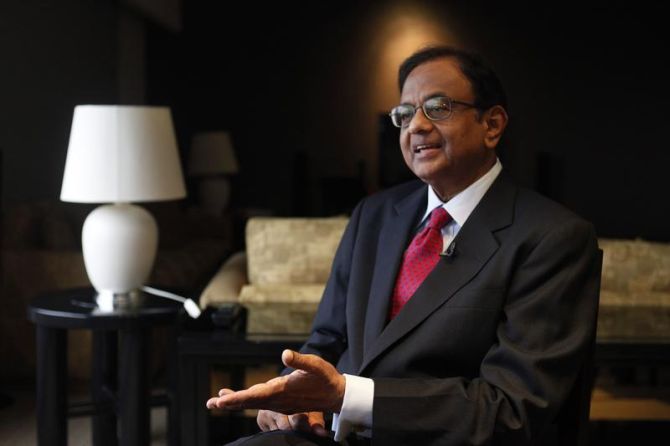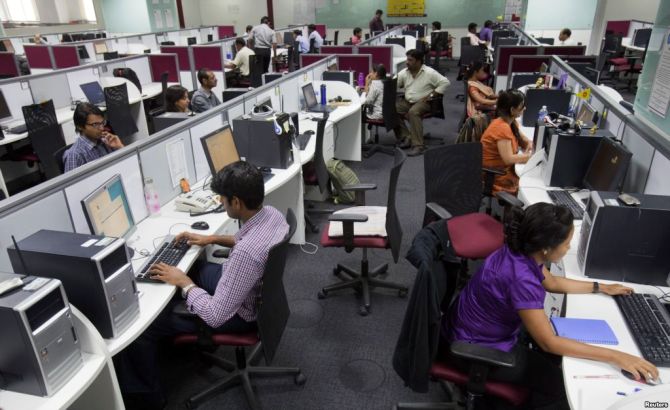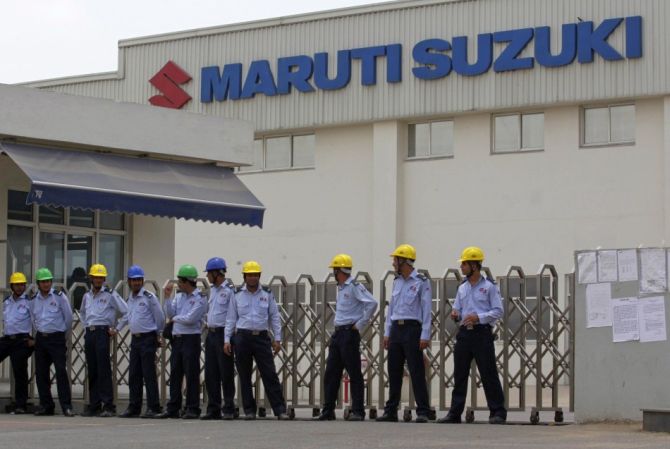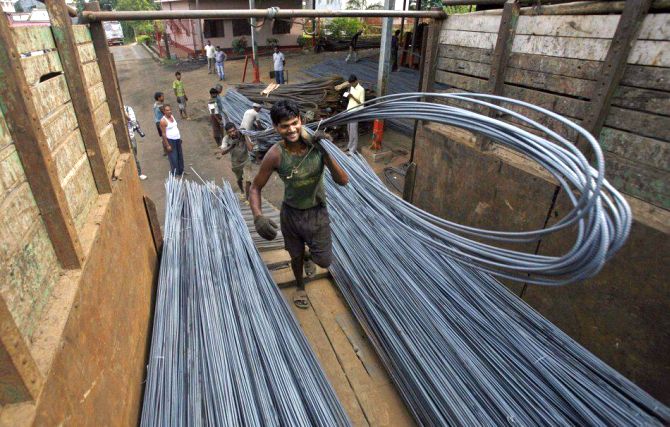Photographs: Thomas Mukoya/Reuters Mihir S Sharma
The private sector has been selfish and greedy, and does not realise that it’s they who should be blamed for the failure of India’s growth story rather than the system and politicians.
India has been grievously let down by its companies and by its CEOs.
It has been let down by them not just because of what they have done - participated in one of the most brazen festivals of crony capitalism in the known universe - or what they have not done - built up genuinely innovative companies, invested in research, shared the fruits of development with labour - but also because of what they have said.
They have blamed everyone else but themselves for the failing Indian growth story; they have pushed wildly contradictory narratives for its failure; they have whined abroad while being loud sycophants at home; they have abandoned India's quest for integration into the global economy, while taking their own investments and assets abroad.
There are individual exceptions, men and women and companies who should be saluted for openness and integrity. But far, far too few.
Some in the government who mistake businessmen for business and capitalists for capitalism have taken up this tone.
…
How India's business leaders have let down the country
Image: Finance Minister P Chidambaram.Photographs: Reuters
Two examples come to mind. Here's one: last week, The Times of India reported that a meeting of the Union Cabinet's apex consultative body on India's trade saw a heated attack by Finance Minister P Chidambaram, generally called "reformist" by the media, on India's bilateral trade agreements.
Mr Chidambaram claimed that free-trade agreements, or FTAs, were a losing proposition for India - that the country did not gain enough by them in increased markets elsewhere to make up for the competition that foreign goods created for domestic manufacturers.
For a reformist, this is a stunning exhibition of pre-1991 thinking. Markets closed to foreign goods and a strong rupee, which Mr Chidambaram also favours, were precisely what reforms were supposed to dismantle.
And the reason remains the same; that it was a vast implicit transfer from India's consumers to its producers.
We, the consumers, had to buy inferior and expensive products, reducing our real income, while business barons made easy profits without having to be competitive.
Openness doesn't allow that sort of free ride; so India Inc and some in government are distressed by it.
Here is another example: India's commerce ministry, led by Commerce Minister Anand Sharma - a man who doesn't understand that investment banks like Goldman Sachs are supposed to evaluate political risk - has stood in the way of foreign investment and trade.
…
How India's business leaders have let down the country
Photographs: Reuters
It diluted Cabinet-approved measures on retail foreign direct investment so much that nobody wants to invest.
The commerce ministry is thwarting trade negotiations with Europe and the United States because it wants to ensure that Indian IT's obsolete body-shopping business model is sanctified by those countries' laws.
And it wants to block multilateral trade deals on behalf of Indian generic pharmaceutical companies, which want to keep on being free to piggyback on innovation elsewhere.
The cost of naysaying? No "trade facilitation" for smaller Indian companies, which would have allowed them to build on a weaker rupee to find new markets globally. Instead, the government will prop up and protect outdated business models.
Union ministers have been more open than CEOs and industrialists, who generally don't talk that much. But they do in private.
An extensive investigation of Indian trade practices by the US Congress - an unprecedented and most unusual effort - has been instigated by corporate America's lobbyists.
Ask what caused them to take on India thus, and they say that they were empowered by Indian businessmen telling them that it was open season on India's weak and defensive government - ignorant or unmindful of the fact that, in doing so, India Inc was harming its own interests.
It is certainly true that Indian business has had much to complain about of late. But its complaints have not a shred of consistency to them.
…
How India's business leaders have let down the country
Photographs: Reuters
After all, is it upset that the system is corrupt, where corruption is defined as subverting the process of natural resource allocation? Well, who benefited from that system? Hint: it wasn't foreigners.
It was Indian companies. Or are they upset about Delhi's "paralysis"? Wait - isn't that the exact opposite? "Paralysis" is just this formerly unquestioned system breaking down for fear of corruption.
Regulatory "clearances" that were earlier taken for granted, no matter what the actual ground situation was, are now no longer automatic.
Tell us, India Inc, are you upset about corruption, or about the denial of the fruits of the system that spawned corruption? It cannot be both.
Even when it comes to the absence of necessary and overdue second-generation reforms, India Inc cannot escape blame.
Consider labour law reform. The United Progressive Alliance has failed to work on these; its predecessor, the National Democratic Alliance, hastily rolled back its sole attempt.
But as one well-known liberaliser in the private sector explained to me recently when I lamented this absence, it's tough to reform labour law when Indian companies' relations with their workers are so poor.
…
How India's business leaders have let down the country
Photographs: Reuters
By and large, companies have failed to train and pay workers properly; they have illegally transformed their workforces, which now consist of casual employees even in core functions, in violation of law and court judgments; they have imposed intolerably hierarchical practices in their factories.
How can politicians argue that these companies be given further power when they have misused what they have currently, I was asked. I had no reply. Nor, I am sure, do India's CEOs.
Much of this would be forgiven if Indian companies were genuinely innovative, if they were capable of moving beyond the constraints that our archaic systems impose on them to building world-beating processes and products.
But they haven't. They have instead made a virtue of "jugaad", the cobbling-together of makeshift solutions.
Our pharmaceutical companies sell dud pills to Africans; toilets in supposedly sanitised factories are without water in which their employees can wash their hands.
Our automobile makers are happier selling big cars to India's elite and free-riding on diesel subsidies instead of opening up markets abroad for the smaller, rugged cars that they could make so well.
Everyone wants vast amounts of land for factories that could be built on a fraction of the acreage demanded.
…
How India's business leaders have let down the country
Photographs: Reuters
Oh, and they all want protection, protection, protection. Far from rising to the challenge of liberalisation, India Inc seems to think it has gone more than far enough.
As one icon of post-1991 industry said at a policy-focused meeting this weekend organised by the US' German Marshall Fund, we should begin any investigation of the recent retreat from reform "inside CII conference rooms".
India's integration into the global economy has been the backbone of the country's growth story and of its rising profile. But business has now turned its back on integration.
Perhaps it senses the wind turning and wants, like the Rashtriya Swayamsevak Sangh, to re-introduce swadeshi.
Indian business, it seems, wants "single-window" clearances, not free markets. It wants politicians - and here I need name no names, since every newspaper's headlines will do so for me in this campaign season - who will pick up the phone immediately when CEOs call, and promise that all pesky regulations will be taken care of.
That, as far as India Inc is concerned, is being "reformist". Newsflash: it's the exact opposite. It's what we left behind in 1991.








article